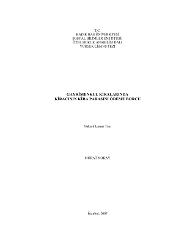| dc.contributor.advisor | Kurt, Ekrem | en_US |
| dc.contributor.author | Nokay, Murat | |
| dc.date.accessioned | 2020-08-11T10:42:23Z | en_US |
| dc.date.available | 2020-08-11T10:42:23Z | en_US |
| dc.date.issued | 2007 | en_US |
| dc.identifier.uri | https://hdl.handle.net/20.500.12469/3146 | |
| dc.description.abstract | Gerek Türk Borçlar Kanununa ve gerekse 6570 sayılı Gayrimenkul
Kiraları Hakkındaki Kanun hükümlerine göre kiracının kira parasını ödeme borcu
en önemli hükümlerindendir. Kira parası ve kira konusu, kira sözleşmesinin temel
unsurlarını teşkil ederler. Kira parası, sözleşmede milli ya da yabancı bir para
olarak ifade edilmektedir. En azından bunun, sözleşmede belirtilen bir formül
doğrultusunda belirlenebilir ve hesap edilebilir olması gerekir. Belli bazı
durumlarda bir kira yılında iki kez kira parasını ödememe nedeniyle ihtar alan
kiracı, bu yüzden kira akdinin feshedilmesiyle yüz yüze kalabilir. Bir kira
sözleşmesinde taraflar para yerine altın veya başka bir şey üzerinde ödeme aracı
olarak anlaşabilirler. Uzun süreli kira sözleşmelerinde kira parasının uyarlanması
ise ayrı bir sorunu teşkil etmektedir. Böyle sözleşmelerde taraflar belirli bir kira
parasını kararlaştırmaktadırlar; ancak sonradan ortaya çıkan olağan üstü iktisadi
veya siyasi gelişmeler kira parasının ödenmesini neredeyse imkansız hale
sokabilmektedir. Böyle durumlarda kiracı hakimden kira parasının değişen duruma
uyarlamasını talep edebilir. Bununla birlikte bu da kural olarak, borçlar hukukuna
hakim bir ilke olan “ahde vefa” ilkesini zedelemektedir. | en_US |
| dc.description.abstract | The rental obligation of the tenant is of the most significant provisions of
both the Turkish Obligations Code and the 6570 numbered Act relating to the
Immovable Hire. The rental and the subject of the hire are the basic elements of
the hire contract. The rental obligation has to be stated as a national or foreign
currency in the contract. At least it should be defined and countable through the
formula given in such a contract. In some certain circumstances the contract of hire
may be dissolved in case of the non-payment of rental if the tenant gets twice
warned in a hire year because of non-payment. In a hire contract the sides may
decide another value such as gold or another thing instead of money as an
instrument of payment. The adoption of the rental is another legal problem in longterm contracts of hire. In such contracts the sides decide a certain rental but the
extra ordinary developments in the economical or political fields, after binding the
contract may turn the situation into a variety that may conclude the rental payment
almost non-payable. In such cases the tenant may demand from the judge to adopt
the rental in accordance with the new situation. However this practice is
principally in contrary with the general rule of “Pacta sund Servanda” in the law of
contracts. | en_US |
| dc.language.iso | tur | en_US |
| dc.publisher | Kadir Has Üniversitesi | en_US |
| dc.rights | info:eu-repo/semantics/openAccess | en_US |
| dc.subject | N/A | en_US |
| dc.title | Gayrimenkul kiralarında kiracının kira parasını ödeme borcu | en_US |
| dc.type | masterThesis | en_US |
| dc.department | Enstitüler, Lisansüstü Eğitim Enstitüsü, Özel Hukuk Ana Bilim Dalı | en_US |
| dc.relation.publicationcategory | Tez | en_US |
| dc.identifier.yoktezid | 206516 | en_US |
















